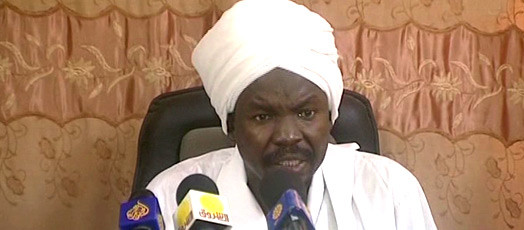The Sudanese government has reportedly chosen the governor of the border state of South Kordofan as lead negotiator with the SPLM-N rebel group, according to press reports from Khartoum.
Governor Ahmed Harun worked alongside the Sudan People’s Liberation Movement (SPLM) during a tense period of ‘unity government’ in the state, then battled the movement from mid-2011 until today.
Negotiations between the Sudanese government and the rebel movement were earlier scheduled to take place in the Ethiopian capital beginning on 5 March but have now been pushed to 10 March.
In earlier indirect negotiations the government delegation was headed by Kamal Obeid. The selection of Harun for the role is not yet confirmed but is hinted at in local papers.
Harun’s appointment may complicate the internationally mediated process, because he is wanted by the International Criminal Court for crimes committed under his command in Darfur including crimes against humanity, genocide and war crimes.
For its part, the SPLM-N has appeared eager to resume negotiations on aid access, but less ready to discuss political issues unless the mediators allow a place at the table for their Darfuri allies. Nonetheless, the movement has reportedly replied to the mediation affirming their participation in the upcoming talks and blamed Khartoum for delays.
SPLM-N Spokesman Arno Lodi said in an interview with Radio Tamazuj, “We received the invitation letter for negotiations. So we are ready for negotiations especially on the issues related to humanitarian situations in the two regions of South Kordofan and Blue Nile.”
The spokesman said that humanitarian issues should be discussed before the other political items on the agenda. On political matters, he pointed to SPLM-N’s earlier demand to include other rebel movements in the negotiating process. He said that there is a need to address the Sudanese problems in a comprehensive manner.
Lodi criticized the UN Security Council Resolution 2046 (which instructed Khartoum and SPLM-N to begin negotiations) for ignoring the role of the Sudan Revolutionary Front (SRF), the umbrella opposition organization to which SPLM-N belongs.
He accused the Khartoum government of always working toward dividing people into regions and tribes as happened in Darfur and South Kordofan, while at the same time dishonouring signed agreements.
“So if the SPLM is called on by the AU to negotiate with the Sudanese government in accordance with UN Security Council Resolution 2046, then SPLM will demand [instead] a comprehensive way of solving Sudan’s problems in addition to solving the deteriorating humanitarian situation in the two regions of South Kordofan and Blue Nile before any negotiation starts,” he said.
“We said the humanitarian situation should be first because people are faced by acute shortage of humanitarian assistance – people are dying and are displaced every day without food, shelter and water.
“After we are assured that the lives of our civilians are safe, then we can turn to any negotiations, as we confirmed our readiness for the cessation of hostilities, but if NCP rejects that then the Sudanese problems will continue like that,” he concluded.




